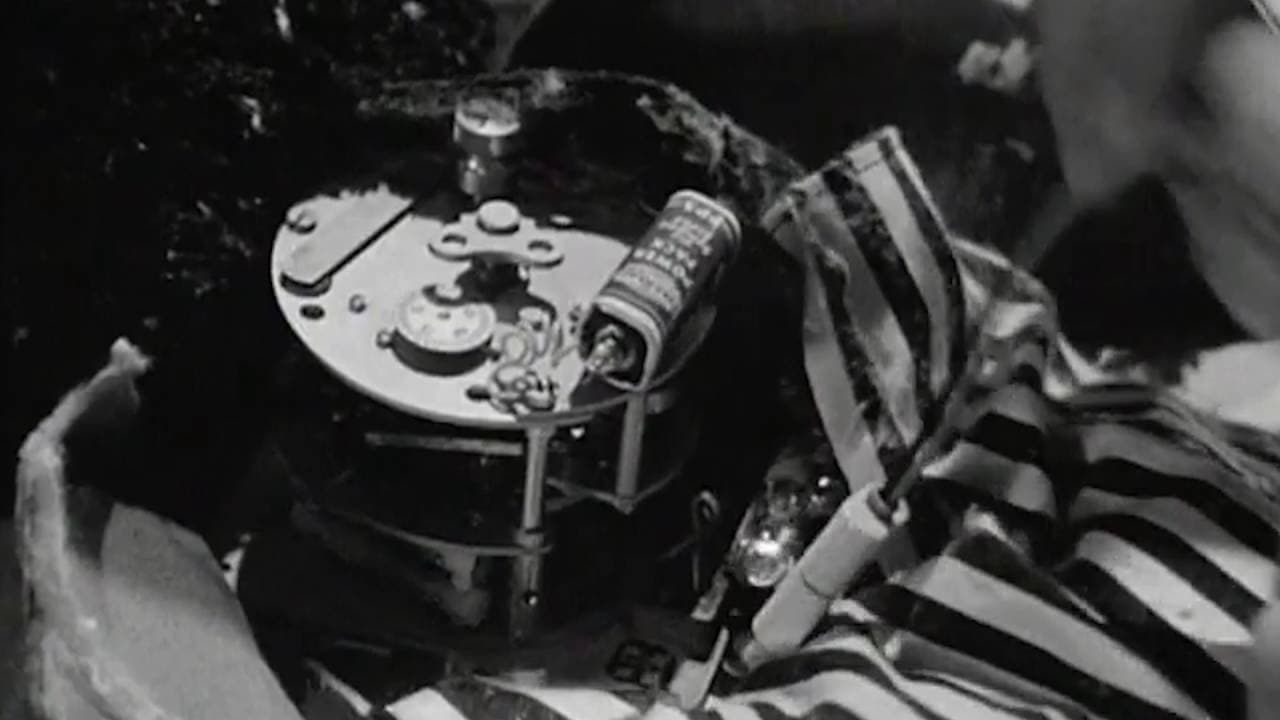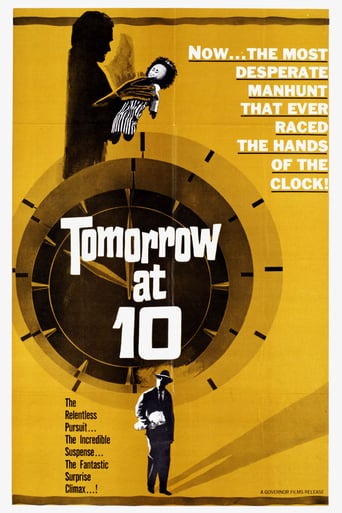

As somebody who had not heard any of this before, it became a curious phenomenon to sit and watch a film and slowly have the realities begin to click into place.
... View Moreif their story seems completely bonkers, almost like a feverish work of fiction, you ain't heard nothing yet.
... View MoreIt is both painfully honest and laugh-out-loud funny at the same time.
... View MoreOne of the most extraordinary films you will see this year. Take that as you want.
... View MoreProducer: Tom Blakeley. A Blakeley's Films Production. A Mancunian Film Corporation Production, released in the U.S.A. by Governor Films: May 1964. No New York opening. U.K. release through Planet: 23 June 1963. Never theatrically released in Australia. 7,210 feet. 80 minutes. (Available on an excellent Odeon DVD).SYNOPSIS: A kidnap plot goes terribly awry.NOTES: John Gregson was sitting on top of the world in 1953, thanks to "Genevieve: which catapulted him, Kenneth More and Kay Kendall to international stardom. Oddly none of the trio's sudden movie success lasted much beyond the 1950s. Kay Kendall died in 1959, and film producers forsook both Gregson and More, when it seemed the picture- going public had tired of them. More's last big success was in "The Greengage Summer" (1961). Though he did make a few sporadic big screen appearances throughout the 1960s, and 1970s, he concentrated on the stage and TV. His last film role was as King Arthur in "Unidentified Flying Oddball" (1979).Gregson's 60s career was equally as sparse, although, like More, he did score one big critical success, "Live Now Pay Later" (1962). Unlike More's "Greengage Summer", however, Gregson's critical triumph proved so unpopular with the public, the movie's Australian distributor didn't even bother to release it! Gregson was reduced to accepting the lead in "Tomorrow at Ten". Good film, good director, but quite a comedown from the dizzy heights of "Genevieve". Gregson's Australian fans were denied the pleasure of seeing their idol in "Tomorrow at Ten" too, until it turned up on TV. There were to be no more top starring roles for Gregson on the big screen. A couple of cameo parts in "The Longest Day" (1962) and "The Night of the Generals" (1966) and a minor role as a doctor in "Fright" (1971) completed his cinema career.Interestingly, all three of the "Genevieve" trio commenced their progress towards stardom well before that fantastic success. More started acting in movies way back in 1935, when he debuted in "Look Up and Laugh", and appeared in eighteen more films before "Genevieve". Gregson made his debut in "Saraband for Dead Lovers" in 1948, and landed eleven more roles before his vintage car brought him fame and fortune. And Kay Kendall, would you believe, made her initial screen appearance in 1944 in "Fiddlers Three". Fourteen films followed until she suddenly became the "discovery sensation" of 1953.COMMENT: Atmospherically directed low-budget effort, with a cast and production values way beyond most of its quota quickie competitors. The screenplay is literate and concise, sometimes even rather witty, whilst the characters are interestingly defined and the plot riddled with suspenseful elements which the director puts across with maximum impact. Basil Emmott's effective camera-work also rates as a major factor in the film's success.OTHER VIEWS: John Gregson. Born at Liverpool in 1919. Married to Thea Gregory. Entered films in 1948. Pictures include Scott of the Antarctic, Saraband for Dead Lovers, Whiskey Galore, Train of Events, Treasure Island, Lavender Hill Mob, etc. 1951: Angels One Five. 1952: The Holly and the Ivy, The Brave Don't Cry, etc. Since 1953 he has appeared in The Venetian Bird, The Titfield Thunderbolt, Genevieve, To Dorothy a Son, Above Us the Waves, Value for Money, Battle of the River Plate, Jacqueline. 1956-57: True as a Turtle. 1959-60: The Captain's Table, Sea of Sand, S.O.S. Pacific, Faces in the Dark. 1960-61: Hand in Hand, Treasure of Monte Cristo, Frightened City. - Studio publicity.
... View MoreTomorrow at ten is directed by Lance Comfort. The film stars John Gregson, Robert Shaw,Alec Clunes, William Hartnell, Kenneth Cope, Piers Bishop and Alan Wheatley.A shifty criminal called Marlowe(Robert Shaw)kidnaps young Jonathan Chester(Piers Bishop)the son of a wealthy man. Marlowe takes him to an abandoned house and locks him in.Marlow has put a bomb which is set to go off the following day in a toy left with the boy. Marlowe goes to the boys father (Alec Clunes)and demands fifty thousand pounds, in exchange for the money Marlowe will take Chester to his son. If the police become involved Marlowe won't say where Jonathan is, this will mean he will be killed when the bomb explodes.Jonathan's nanny phones the police when Marlowe comes to speak to Mr. Chester. Tough police Inspector Parnell (John Gregson)is sent to deal with the situation. Parnell tries to intimidate Marlow, he want's to arrest him but is prevented from doing so by his boss (Alan Wheatley). Parnell must try and get Marlowe to reveal some information about where Jonathan is before it's too late.I've never been much of a fan of John Gregson, but he really impressed me in this, playing Parnell as a no nonsense copper who treats criminals exactly how they deserve to be treated. Robert Shaw is very good as the deranged Marlowe, he manages to steal every scene he's in with just a look.The supporting cast all deliver solid performances and there's lots of suspense. Is it believable that Mr. Chester would be allowed to be left alone with Marlowe when time was running out? Probably not, and I think that is a flaw for the film; it doesn't make this any less enjoyable though.Good performances and plenty of suspense help make this well worth a watch.
... View MoreTomorrow at 10 (1962) is a minor masterpiece only let down by a short running time (77 minutes) which does not allow its themes to be more thoroughly explored. But with a stand out performance from a young Robert Shaw (Jaws), and an effective film noir style adopted by underrated British 'B' film director Lance Comfort, it is worth watching.Briefly this is a story of child abduction. A crook kidnaps the child of a wealthy industrialist and locks him in the room of an abandoned house with a time bomb. But woven into the narrative is the issue of class (particularly relevant in 1950s/early 1960s Britain). Robert Shaw is working class, and it is with him that our sympathies lie – not with Alec Clunes' arrogant Anthony Chester who believes that any problem can be solved if enough money is thrown at it.Lines like "they probably met at a hunt ball" and "that's what I like about the police force...the informal relationship that exists between all ranks" delivered by John Gregson's honest detective about the social climbing Commissioner Bewley, highlight a sneering attitude towards class, rank and insignia. And ironically, it is the respectable and bourgeois Chester who commits murder.Tomorrow at 10 works because it does not waste time with police procedure, and the result is taut and fast paced. Sharp and terse dialogue combine with Comfort's fluid camera work and Peter Pitt's economic editing to keep the viewer alert as every action seems to provoke an immediate reaction.Finally, this review would not be complete without mentioning the opprobrious 'Golly' that appears in the film. Unjustly stigmatised by the politically correct, the Golly's origins are relatively innocent, and it is nice to know that there was a time when this harmless toy could be used without fears of reprisal. Here it serves its purpose as a totemic emblem of Robert Shaw's corrupted childhood, appropriate then that it should be stuffed with a time bomb and given to his child victim.
... View MoreThe most telling points of this neat little British second feature, are the strong cast of Shaw, Gregson, Clunes, Wheatley and Cope, allied with a lively script and tight direction from Lance Comfort. The plot is tidy and unfussy and proceeds well towards its somewhat novel conclusion. Robert Shaw is excellent as the disturbed kidnapper, Marlow, and sterling support is provided by John Gregson as the police inspector. Some of the scenes are a little over the top, especially the one concerning the dancers in the nightclub, which by today's standards is quite hilarious! Not a classic by any means, but well worth watching in any event.
... View More